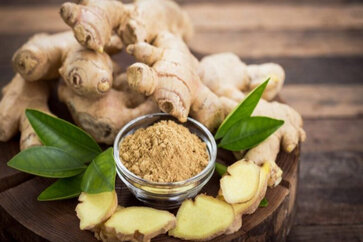How to Treat PCOD and PCOS in Ayurveda?
Polycystic Ovary Syndrome (PCOS) is a common hormonal disorder affecting women of reproductive age. Characterized by irregular menstrual cycles, cysts on the ovaries, and hormonal imbalances, PCOS can have a significant impact on a woman’s health and well-being.
While conventional medical treatments are available, many individuals are turning to Ayurveda for a holistic and natural approach to managing PCOS. In this article, we will explore Ayurvedic treatments for PCOS and how they can help restore hormonal balance and alleviate symptoms.
PCOD vs PCOS
Polycystic Ovarian Disease (PCOD) and Polycystic Ovary Syndrome (PCOS) are two common hormonal disorders that affect women, often during their reproductive years.
While these conditions share some similarities, they also have distinct characteristics. Let’s delve into the details of PCOD and PCOS, their causes, symptoms, and potential treatments.
PCOD (Polycystic Ovarian Disease)
What is PCOD?: Polycystic Ovarian Disease (PCOD), also known as Polycystic Ovarian Syndrome (PCOS), is characterized by the presence of multiple cysts on a woman’s ovaries. These cysts are essentially follicles that contain eggs but have not matured or been released during the menstrual cycle.
Causes of PCOD: The exact cause of PCOD is not well understood, but it is believed to be influenced by a combination of genetic and environmental factors. Insulin resistance and hormonal imbalances, such as elevated levels of luteinizing hormone (LH), play a significant role in the development of PCOD.
PCOD Symptoms: Women with PCOD may experience irregular menstrual cycles, heavy bleeding, weight gain, acne, and excess hair growth (hirsutism). PCOD can also lead to infertility due to irregular ovulation.
PCOD Treatment: Treatment for PCOD typically involves hormonal medications to regulate menstrual cycles and reduce the symptoms. Lifestyle modifications, including maintaining a healthy weight, exercising regularly, and managing stress, are also essential for managing PCOD.
PCOS (Polycystic Ovary Syndrome)
What is PCOS?: Polycystic Ovary Syndrome (PCOS) is a hormonal disorder characterized by a range of symptoms, including irregular or absent menstrual periods, excess production of androgens (male hormones), and the development of multiple small fluid-filled sacs (follicles) in the ovaries.
Causes of PCOS: The exact cause of PCOS is not fully understood, but it is associated with insulin resistance and hormonal imbalances, similar to PCOD. Genetic factors may also contribute to the development of PCOS.
PCOS Symptoms: Women with PCOS may experience irregular menstrual cycles, acne, hair thinning, weight gain, and fertility issues. PCOS can also increase the risk of other health conditions, such as diabetes and cardiovascular disease.
PCOS Treatment: Treatment for PCOS focuses on managing symptoms and reducing long-term health risks. This may include hormonal birth control to regulate periods, anti-androgen medications to address excess hair growth and acne, lifestyle changes, and, in some cases, fertility treatments.
Ayurveda and Natural Therapies
Both PCOD and PCOS can benefit from holistic approaches, such as Ayurveda and natural therapies. Ayurvedic treatments often involve dietary adjustments, herbal remedies, stress management techniques like yoga and meditation, and detoxification.
Understanding the Causes and Symptoms of PCOD
Polycystic Ovary Disease (PCOD), also known as Polycystic Ovary Syndrome (PCOS), is a common hormonal disorder that affects women, especially during their reproductive years.
It can manifest through various signs and symptoms, and early recognition and diagnosis are crucial to managing the condition effectively. Let’s explore the causes and symptoms of PCOD:
Causes of PCOD
The exact cause of PCOD is multifactorial and may involve a combination of genetic, hormonal, and lifestyle factors. Some contributing factors include:
1. Hormonal Imbalance: PCOD is characterized by an imbalance in hormones, particularly elevated levels of androgens (male hormones) in women. This hormonal disruption can affect the normal functioning of the ovaries.
2. Insulin Resistance: Insulin is a hormone that regulates blood sugar levels. In PCOD, some women develop insulin resistance, where their bodies do not respond effectively to insulin. This can lead to elevated insulin levels, which, in turn, contribute to hormonal imbalances.
Symptoms of PCOD
PCOD can manifest through a range of symptoms, which may vary in severity among individuals. Common symptoms include:
1. Irregular Menstrual Cycles: Women with PCOD often experience irregular periods, which may be infrequent or absent. This irregularity is due to disrupted ovulation.
2. Excess Hair Growth (Hirsutism): Elevated androgen levels can lead to increased facial and body hair growth, particularly in areas where men typically grow hair.
3. Acne: Hormonal imbalances can trigger acne outbreaks, often along the jawline, chin, and other areas of the face and body.
4. Obesity: PCOD is often associated with weight gain and difficulty in managing body weight. Insulin resistance can contribute to obesity.
5. Mood Swings: Hormonal fluctuations in PCOD can lead to mood swings, irritability, and emotional sensitivity.
6. Abnormal Hair Loss: Some women with PCOD may experience hair thinning or hair loss from the scalp.
7. Difficulty in Conceiving: PCOD can affect fertility by disrupting the regular release of eggs during the menstrual cycle, making it challenging for some women to conceive.
8. Insulin Resistance: Elevated insulin levels can lead to insulin resistance, which increases the risk of developing type 2 diabetes.
Understanding the Causes and Symptoms of PCOS
Polycystic Ovary Syndrome (PCOS) is a complex hormonal disorder that affects many women worldwide. While its precise cause remains elusive, researchers have identified several contributing factors.
Factors may be including genetics, elevated androgen levels (male hormones), and insulin resistance. Understanding these factors is essential to recognize and manage PCOS effectively. Let’s delve into the causes and symptoms of PCOS:
Causes of PCOS
1. Genetic Predisposition: There is strong evidence to suggest that genetics play a significant role in the development of PCOS. Women with a family history of the condition are at a higher risk of experiencing it themselves.
2. Androgen Levels: PCOS is associated with higher levels of androgens in a woman’s body. These elevated androgens can disrupt the normal functioning of the ovaries, leading to irregular menstrual cycles and the formation of ovarian cysts.
3. Insulin Resistance: Insulin is a hormone responsible for regulating blood sugar levels. In PCOS, some individuals develop insulin resistance, a condition where the body’s cells do not respond effectively to insulin. This results in elevated insulin levels, which can stimulate the ovaries to produce excess androgens.
Symptoms of PCOS
PCOS can manifest through a range of symptoms, which may vary in severity among individuals. Common symptoms include:
1. Irregular Menstrual Periods: Women with PCOS often experience irregular or absent menstrual periods due to disrupted ovulation.
2. Obesity: Many individuals with PCOS struggle with weight gain or obesity. Insulin resistance can contribute to weight management difficulties.
3. Ovarian Cysts: PCOS is characterized by the development of small fluid-filled sacs (cysts) on the ovaries, which can be detected through imaging tests.
4. Skin Changes: Some women with PCOS experience darkening of the skin, particularly in areas such as the neck, underarms, and groin.
5. Hirsutism: Elevated androgens can lead to increased facial and body hair growth, often referred to as hirsutism.
6. Hair Thinning: PCOS can result in thinning hair or hair loss from the scalp.
7. Infertility: Disrupted ovulation and hormonal imbalances can make it challenging for women with PCOS to conceive.
Ayurvedic Treatment for PCOS or PCOD
Polycystic Ovary Syndrome (PCOS) is a complex hormonal disorder that affects many women. Ayurveda, with its holistic approach, offers various treatments that can help manage this condition effectively.
One of the key elements of Ayurvedic PCOS treatment is the use of specific herbs known for their ability to balance hormones and promote overall well-being. Here are some Ayurvedic herbs that can be considered in the treatment of PCOS:
1. Cinnamon
What is Cinnamon?: Cinnamon is a spice obtained from the bark of the cinnamon tree, valued not only for its culinary uses but also for its medicinal properties.
PCOS Benefits of Cinnamon: Recent studies, including one from 2020, have shown that cinnamon can have a positive impact on insulin resistance parameters in individuals with PCOS.
It’s worth noting that approximately 50% of women reported that cinnamon helped promote regular menstrual cycles, particularly beneficial for those with PCOS.
2. Turmeric
What is Turmeric?: Turmeric is a bright yellow spice renowned for its active compound, curcumin, known for its potent anti-inflammatory properties.
PCOS Benefits of Turmeric: Curcumin in turmeric acts as an anti-inflammatory agent, effectively reducing insulin resistance and alleviating PCOS symptoms.
Turmeric extracts have demonstrated promise in improving lipid profiles, hormonal balance, antioxidant status, and glycemic control, making them a valuable addition to PCOS treatment.
3. Ashwagandha
What is Ashwagandha?: Ashwagandha, also known as “winter cherry” or “Indian ginseng,” is a prominent Ayurvedic herb with adaptogenic properties.
PCOS Benefits of Ashwagandha: Ashwagandha plays a crucial role in balancing cortisol levels, thereby reducing stress and improving PCOS symptoms. Its adaptogenic nature makes it an invaluable tool for addressing hormonal imbalances associated with PCOS.
Yoga Asanas for Treating PCOS or PCOD
Ayurveda, yoga, meditation, and natural therapies are known to offer significant benefits in managing a wide range of health conditions, including diabetes, sugar-related issues, PCOS, PCOD, obesity, stress, anxiety, and more.
When dealing with PCOS or PCOD disorders, Ayurvedic practitioners often recommend incorporating yoga, meditation, and natural therapies into the treatment plan.
These practices can help alleviate symptoms and promote overall well-being, especially during periods of stress and anxiety. Here are some yoga asanas (poses) that can be particularly beneficial for women with PCOS:
1. Corpse Pose (Shavasana)
Benefits of Shavasana: Shavasana, or the Corpse Pose, is a relaxation pose that helps reduce stress and anxiety. It promotes deep relaxation and mental calmness, which can be especially helpful for individuals with PCOS, as stress management is crucial in managing this condition.
2. Mill Churning Pose (Chakki Chalanasana)
Benefits of Chakki Chalanasana: Chakki Chalanasana, or the Mill Churning Pose, involves circular movements of the legs and abdomen. This asana can aid in improving digestion, which is often affected in individuals with PCOS. It also helps in toning the abdominal muscles and reducing abdominal fat.
3. Bharadvaja’s Twist (Bharadvajasana)
Benefits of Bharadvajasana: Bharadvajasana, a seated twisting pose, helps massage the abdominal organs, which can improve digestion and alleviate bloating and discomfort commonly associated with PCOS. It also stretches the spine and promotes flexibility.
4. Reclining Butterfly Pose (Supta Baddha Konasana)
Benefits of Supta Baddha Konasana: Supta Baddha Konasana, or the Reclining Butterfly Pose, is a gentle hip opener that helps relieve tension in the pelvic region. It can be particularly beneficial for women with PCOS as it supports the health of the reproductive organs and promotes relaxation.
Diet Recommendations
Polycystic Ovary Disease (PCOD) can be managed more effectively through dietary choices that promote hormonal balance and overall well-being.
Incorporating specific foods into your diet can help alleviate symptoms and improve your health. Here are some food items that PCOD patients may consider including in their meals:
1. Spices such as Cinnamon and Turmeric
Benefits: Cinnamon and turmeric have anti-inflammatory properties and can help regulate blood sugar levels, which is beneficial for individuals with PCOD. Cinnamon may also positively impact insulin resistance.
2. Dark Red Fruits such as Beetroot, Crimson Grapes, Blueberries, Cherries, and Blackberries
Benefits: These fruits are rich in antioxidants and fiber, which can help combat inflammation and improve insulin sensitivity. They also provide essential vitamins and minerals.
3. Natural and Unrefined Foods
Benefits: Opt for whole, unprocessed foods like whole grains, fresh fruits, and vegetables. These foods provide essential nutrients and fiber while avoiding the additives and sugars often found in processed foods.
4. Fishes with High Omega Fatty Acids such as Tuna, Salmon, Sardines, and Mackerel
Benefits: Fatty fish are excellent sources of omega-3 fatty acids, which have anti-inflammatory properties and can support heart and hormonal health. Omega-3s may help reduce insulin resistance in PCOD.
5. Dark Chocolate in Moderation
Benefits: Dark chocolate, with a high cocoa content, contains antioxidants and may have mood-boosting effects. Enjoy it in moderation as an occasional treat.
6. Intake of Healthy Fats such as Coconuts, Olive Oil, Pine Nuts, Walnuts, Almonds, Pistachios, and Avocado
Benefits: Healthy fats are essential for hormone production and overall health. They provide a steady source of energy and can help stabilize blood sugar levels.
7. Leafy Vegetables such as Spinach, Broccoli, and Kale
Benefits: Leafy greens are rich in vitamins, minerals, and fiber. They support overall health and can help manage weight, which is beneficial for PCOD.
Panchakarma Therapies for PCOS
Specific Panchakarma therapies that may be beneficial for PCOS management include Vamana (emesis therapy), Virechana (purgation therapy), and Basti (enema therapy). The choice of therapy depends on an individual’s unique constitution and the severity of their PCOS symptoms.
The Role of Panchakarma
Panchakarma, which translates to “five actions,” is a set of therapeutic procedures aimed at detoxifying and rejuvenating the body. In the context of PCOS management, Panchakarma plays a pivotal role in several ways:
1. Detoxification: Panchakarma therapies help eliminate accumulated toxins (ama) from the body. This detoxification process is crucial as it helps restore balance to the doshas, particularly Kapha and Pitta. Removing toxins can enhance hormonal balance.
2. Balancing Hormones: Panchakarma therapies work on the endocrine system and help regulate hormones. This can be particularly beneficial for individuals with PCOS, as hormonal imbalances are a hallmark of the condition.
3. Improving Insulin Sensitivity: Insulin resistance is a common issue in PCOS. Panchakarma therapies can help improve insulin sensitivity, which, in turn, can assist in better blood sugar regulation.
4. Enhancing Metabolism: Slow metabolism is another concern in PCOS. Panchakarma therapies stimulate the digestive fire (agni) and support efficient metabolism, aiding in weight management and overall health.
5. Addressing Weight Management: Effective weight management is a crucial aspect of PCOS management. Panchakarma can help in shedding excess weight and preventing further weight gain.
4 Effective Panchakarma Therapies for PCOS
Polycystic Ovary Syndrome (PCOS) is a complex condition that requires a holistic approach to management. Ayurveda, with its emphasis on natural therapies, offers several Panchakarma treatments that can be highly effective in addressing PCOS symptoms. Here are four of the most effective Panchakarma therapies for managing PCOS:
1. Vamana
What is Vamana?: Vamana is a detoxifying and cleansing therapy that involves the systematic removal of toxins through induced vomiting. It is typically recommended during the spring season for optimal results.
Benefits for PCOS Management: Vamana therapy helps eliminate toxins and balance doshas, making it valuable for addressing PCOS-related hormonal imbalances and detoxifying the body. Nimba Nature Cure in Gujarat provides excellent Vamana Panchakarma therapy.
2. Virechana
What is Virechana?: Virechana is another detoxification Panchakarma therapy that involves the induction of purgation to eliminate toxins by increasing bowel movements.
Benefits for PCOS Management: Virechana therapy can aid in managing obesity, irregular periods, skin pigmentation, and other PCOS symptoms. It promotes detoxification and balances doshas. Nimba Nature Cure offers tailored Virechana Panchakarma therapy based on individual health conditions.
3. Basti
What is Basti?: Basti Chikitsa, or Basti therapy, is considered one of the most effective Ayurvedic Panchakarma therapies for managing PCOS symptoms. It involves the administration of various Ayurvedic substances such as ghee, oil, herbs, or kashya through enemas.
Benefits for PCOS Management: Basti therapy is customized to the individual’s health condition and helps balance doshas, particularly in the lower abdomen. It is renowned for its effectiveness in managing PCOS symptoms. Nimba Nature Cure boasts experienced Ayurveda specialists and therapists for Basti therapy.
4. Udvartana
What is Udvartana?: Udvartana is an external Ayurvedic body therapy that employs dry herbal powder for a full-body massage.
Benefits for PCOS Management: Udvartana therapy enhances blood and lymph circulation, detoxifies the skin, and promotes metabolic functions. It can aid in weight loss, making it beneficial for PCOS management.
Frequently Asked Questions About PCOD and PCOS
Q1: How to treat PCOD and PCOS in Ayurveda?
A1: Ayurvedic treatment for PCOD and PCOS typically involves a combination of herbal remedies, dietary modifications, lifestyle changes, and Panchakarma therapies tailored to the individual’s unique constitution. Consultation with an Ayurvedic practitioner is essential for a personalized treatment plan.
Q2: Can PCOD be cured permanently by Ayurveda?
A2: While Ayurveda can effectively manage PCOD symptoms and improve overall health, the condition may not always be permanently cured. Lifestyle and dietary changes, along with Ayurvedic treatments, can help individuals lead healthier lives with reduced PCOD symptoms.
Q3: What is the best treatment for PCOD in Ayurveda?
A3: The best treatment for PCOD in Ayurveda varies from person to person based on their constitution and symptoms. Common Ayurvedic treatments include herbal remedies, Panchakarma therapies like Vamana and Virechana, and lifestyle adjustments.
Q4: How can I reduce PCOS and PCOD naturally?
A4: Natural approaches to reducing PCOS and PCOD include maintaining a balanced diet, engaging in regular exercise, managing stress, and incorporating Ayurvedic remedies and therapies. Consultation with an Ayurvedic practitioner can guide you in a personalized natural treatment plan.
Q5: How can I permanently cure PCOD?
A5: Achieving a permanent cure for PCOD may not always be feasible, but Ayurvedic treatments and lifestyle modifications can help manage the condition effectively and improve quality of life.
Q6: Can Ayurveda reverse PCOD?
A6: Ayurveda can help manage and alleviate PCOD symptoms, but complete reversal may not always be guaranteed. Ayurvedic therapies aim to restore balance and promote overall well-being.
Q7: How can I lower my PCOD in one month?
A7: Lowering PCOD symptoms in one month is challenging, but you can start by adopting a balanced diet, regular exercise, stress management, and incorporating Ayurvedic remedies. Consult an Ayurvedic practitioner for guidance.
Q8: Is Ashwagandha good for PCOD?
A8: Ashwagandha is known for its adaptogenic properties, which can help manage stress, a common factor in PCOD. It may support hormonal balance and overall well-being. However, consult an Ayurvedic practitioner before use.
Q9: Which fruit is good for PCOD?
A9: Fruits rich in antioxidants and fiber, such as berries (blueberries, strawberries), pomegranates, and apples, can be beneficial for PCOD management. They support overall health and may help control insulin levels.
Q10: What is the minimum time to cure PCOD?
A10: The issue of PCOD can potentially be permanently resolved within a maximum of six months. However, achieving this outcome requires consistent adherence to the tips mentioned above.
The duration to see improvement or manage PCOD varies among individuals. Ayurvedic treatments require time and consistency. It is advisable to work closely with an Ayurvedic practitioner to monitor progress.
Q11: Which medicine is 21 days for PCOD?
A11: Ginette 35 Tablet 21 is an oral hormonal combination that includes Ethinylestradiol and Cyproterone. It is prescribed to alleviate the symptoms associated with polycystic ovary syndrome (PCOS).
However, there is no specific 21-day medication for PCOD. Ayurvedic treatments are personalized, and the duration of treatment may vary based on individual needs and the severity of the condition. Consult an Ayurvedic practitioner for a tailored treatment plan.
References:
- Clinical efficacy of Ayurveda treatment regimen on Subfertility with Poly Cystic Ovarian Syndrome (PCOS)(1)
- A Case Study on Ayurvedic Management in PCOS(2)
- Ayurveda management of infertility associated with Poly Cystic Ovarian Syndrome: A case report(3)
- Management of Polycystic ovarian syndrome (PCOS) with Ayurveda – a case study(4)
- Ayurved management of PCOS: A Case Report(5)
- A review of management of Polycystic Ovarian Syndrome through Ayurveda(6)


























